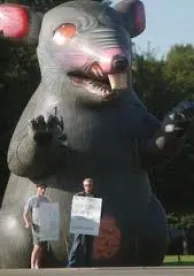Continuing its efforts to overturn precedent, the NLRB General Counsel’s Division of Advice has issued a new advice memorandum looking to strike at the most recognizable sign of unionism in urban areas today – – the inflatable rat that is used to signal a labor dispute to the public.
It has been long held by the Supreme Court that while handbilling at a neutral employer’s business is lawful, picketing urging a boycott of the neutral employer is coercive and therefore unlawful. Edward J. DeBartolo Corp. v. Florida Gulf Coast Building & Construction Trades Council (DeBartolo II), 485 U.S. 568, 579-80 (1988).
The issue presented with inflatable animals and large banners is whether objects and signs rise to the level of picketing conduct, and not simply free speech. For years, the National Labor Relations Board has ruled that rats and large banners are elements of free speech that do not rise to the level of “picketing” conduct that would be evidence of unlawful secondary boycott conduct. In its recent memo, the General Counsel sought to use a case out of Chicago — involving, ironically, a large inflatable cat — to go after this precedent.
In the Advice Memorandum (which was dated December 20, 2018, but was released on May 14, 2019), the General Counsel’s Office directed Region 13 to issue a Complaint against the International Brotherhood of Electrical Workers Local 134, finding that the union violated the “secondary boycott” provisions of the National Labor Relations Act by erecting a large, stationary banner proclaiming a labor dispute with the general contractor as well as a large, inflatable cat clutching a construction worker by the neck, near the entrance of the construction site.
The general contractor was “neutral” as it did not employ electricians directly. Rather, the “primary” employer was a subcontractor on the job site. It was undisputed that the union posted agents to hold the banner and used the inflatable cat at the entrance to the construction site, with the aim of forcing the neutral employer to cease using its electrical subcontractor.
The Region was directed to use the case as a vehicle to urge the Board to reconsider its decisions in a trio of decisions that were issued during the Obama administration, which found similar conduct protected and not unlawful “picketing” of a neutral employer under the Act:
- A union’s posting of agents holding large, stationary banners proclaiming “labor dispute” and “shame on [the employer” in front of neutral businesses (Carpenters Local 1506 (Eliason & Knuth of Arizona), 355 NLRB 797 (2010));
- A union’s use of a large, inflatable rat in front of a neutral employer was neither picketing nor otherwise coercive (Sheet Metal Workers Local 15 (Brandon Medical Center) (Brandon II), 356 NLRB 1290 (2011)); and
- Erecting banners at 19 different neutral employers’ premises proclaiming “shame” on them (Carpenters Southwest Regional Councils Locals 184 & 1498 (New Star), 356 NLRB 613 (2011)).
After a lengthy review of the existing precedent, the Division of Advice concluded that the trio of cases struck the wrong balance between speech and picketing activity, and that the General Counsel believed the union’s “activity was tantamount to unlawful secondary picketing, and signal picketing that unlawfully induced or encouraged neutral employees to cease working.” 13-CC-225655 at 1, 14-17. Alternatively, Advice urged the Region to argue that the conduct “at least constituted unlawfully coercive non-picketing conduct” in violation of the Act. Id. at 1, 17-18.
Unfortunately, the cat will not actually catch the rat this time. Since the Memorandum was initially distributed to the parties in late December, the parties settled the unfair labor practice charge. As a result, this case will not serve as the test case to the Board the General Counsel is seeking. However, this Memorandum clearly illustrates the General Counsel’s policy on this issue and how Regions likely will be required to interpret the Act and prosecute potential union conduct in similar circumstances. Given the proliferation of inflatable rats, it may be only a matter of time until the Board gets its chance to review its position.




 />i
/>i

